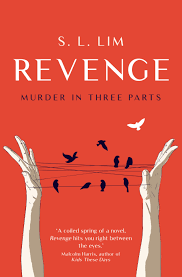Revenge: Murder in Three Parts (Transit Lounge 2020) is the second novel by S.L. Lim. Set in two countries, as with her first book, Real Differences, Revenge examines the cultural norms and expectations of a diverse family, but while the societal and class privilege themes are prevalent, it is the exploration of family dynamics that drives this novel’s narrative.
Yannie is expected to stay at home and care for her aging parents while her brother Shan is sent overseas, eventually to Australia, to study and make his fortune. Her brother was an atrocious bully to her when they were growing up – a vicious, violent and threatening presence. And when Yannie visits Australia as an adult, after her parents’ deaths, she finds that her brother has not changed. Her childhood claim: ‘Before I go into my grave, I will kill that man’ hangs like a portent over the many stages of her life. The depictions of Shan’s violence during childhood are truly terrible and although many years pass, it is fascinating to watch the dynamics unfold as the siblings reconnect – between each other, between Shan and his wife and daughter, between Shan and his employees.
The narrative moved too quickly for me from Yannie’s childhood to her adolescence to her life as an older person, merely skimming over much in the middle. But I can see what the author is doing – connecting those early abusive experiences with the circumstances in which she finds herself in later life. Never was there a more appropriate truism, that ‘revenge is a dish best served cold’.
Despite the slightly unsettling speed of the story, I believe this is a much more sophisticated novel than the author’s first book, and the development of her themes and her writing is apparent. It will be very interesting to see how S.L. Lim’s craft is honed in future work.
The strength of Revenge is in the characterisations and the thought that has gone into the dynamics of relationships and power, the case of capitalism versus art, and the nuanced complexities of sexuality. There are a couple of completely unexpected plot twists that really surprised me, and the ending is strangely different to the rest of the narrative, with an unearthly, poetic and dreamlike quality.
Yannie is not necessarily always likeable but she is definitely a character that is continually evolving, and someone who demonstrates courage, persistence and fortitude in the face of many disadvantages. This is very much a book about the expectations upon daughters and sisters and wives, and about what happens when you don’t meet those expectations, or when you deny your own desires in the service of familial duty and responsibility.
Occasionally I discovered a lyrical line or passage that shows what this writer is capable of and which encapsulated the themes explored in this story, for example: ‘It is possible to love a person, a place, a time, without wanting to remain there’. Simple, poignant and true.

